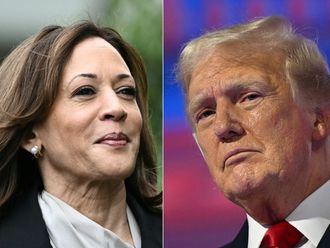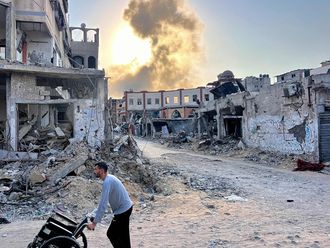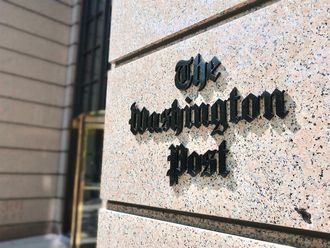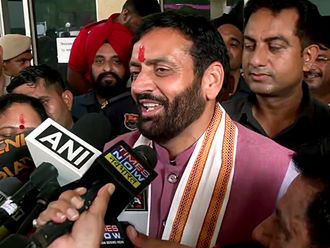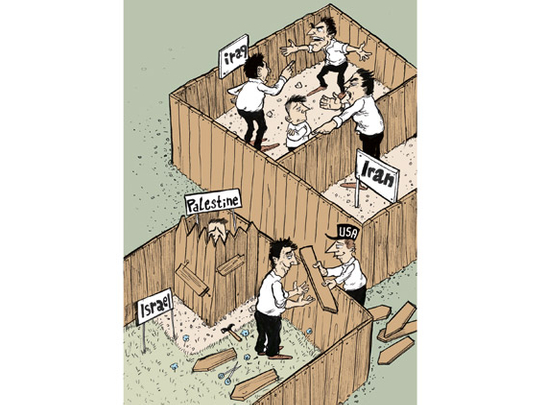
The Middle East is witnessing major changes and shifts in the traditional status quo which is upsetting the power structure that has existed in the region for the last few decades. These upheavals have sparked fears that the region could descend into war and instability.
The highly-charged atmosphere points to a chilling scenario of war sparked by sanctions against Iran over its nuclear programme or a military strike by Israel. Tel Aviv has been massing warplanes and military hardware in the Caucasus, in particular Azerbaijan and Georgia. The US also keeps reminding everyone that all options are on the table with regard to Iran.
The complete stagnation of the Middle East peace process which has bedeviled the US and unmasked its limited influence over the hardline Likud-led Israeli government is a worry.
Washington's failure to steer the Middle East towards a more stable path is appalling. The US knows only too well the centrality of the Israel-Palestine conflict and its impact on all other crises and issues in the region.
Squandering opportunities and caving in to limited interests and domestic pressure with the US mid-term election looming next November is pushing and pulling the region towards the abyss. There is the threat of Israeli military action against Hezbollah at the height of the US mid-term elections when the Obama administration will be hard-pressed to rein in Tel Aviv.
It is ironic that while the US is fully aware of the significance of a comprehensive and lasting solution to the Middle East conflict, it keeps failing to achieve that critical breakthrough.
Resolving it could mitigate and ameliorate the other issues in the region since the other issues are by and large intertwined, influenced and impacted by the mother of all crises in the region.
The US has even made the connection between the region's pressing issues. Last April, US National Security adviser General James Jones laid out the two "defining challenges confronting the US and its allies in the region: Preventing Iran from acquiring nuclear weapons and the means to deliver them, and forging a lasting peace between Israelis and Palestinians as part of a comprehensive peace in the region".
It is ironic that the US administration understands the link between these two vexing challenges, but fails to make any headway in resolving either of them.
General Jones alluded to the link between these issues, arguing that "one of the ways Iran exerts influence in the Middle East is by exploiting the ongoing Arab-Israeli conflict. Iran uses the conflict to keep others in the region on the defensive and to try to limit its isolation. Ending this conflict, achieving peace between Israelis and Palestinians and establishing a sovereign Palestinian state would therefore take an evocative issue away from Iran, Hezbollah and Hamas".
While the US is fully engaged in proximity talks, which seem to be going nowhere, the Israeli foreign minister made a provocative statement. He voiced his belief that he does not expect a Palestinian state by 2012, the end of Obama's first term in office. So is all the negotiation and fuss an exercise in futility?
Add to this the stalemated Iraqi political scene in a year when the US will start its long-awaited military withdrawal of its combat troops, a prelude to full military withdrawal by December 2011.
Iraq's politicians, unfortunately, are posturing, horse-trading and jockeying for power and posts four months after the parliamentary election. With foreign powers, especially Iran, meddling in Iraqi affairs, the leading figure in the Iraqi National coalition and former Iraqi national security adviser Mowaffak Al Rubaie said that Iran is a major player in Iraq. In a revealing statement, he admitted that an Iranian Islamic Revolutionary Guards officer called Qasim Sulaimani is in charge of the Iraqi file and is calling the shots in Iraq.
Meanwhile, political groups continue to lobby for power and posts to form the long overdue cabinet. The Iraqi political system continues to experience the pangs and pain of the transition to a normal state. The last failed state index put Iraq at number six out of 177 countries, a ranking Iraq has been holding on to for the past few years.
Another survey, Mercer's 2010 Quality of Living Survey, which ranks 221 cities, with Vienna at the top, places Baghdad at the bottom of its list in terms of quality of life.
Considering these ominous crises and challenges, along with the absence of any real breakthrough in any of the pressing issues, we are excused if we do not feel optimistic. We are at a critical crossroads in the region, we are even lucky if we could dodge any escalation or war.
As long as there is no breakthrough, and the US fails to play the role of a responsible mediator, and as long as regional players continue to take advantage of the situation and act irrationally based on greed and miscalculations, we can only expect sobering and chilling outcomes with far-reaching consequences.
In the end, we could all be losers!
Professor Abdullah Al Shayji is the Chairman of the Political Science Department, Kuwait University.


